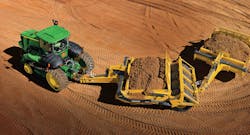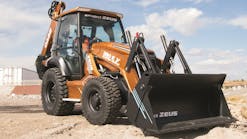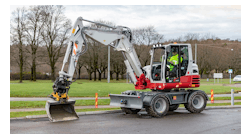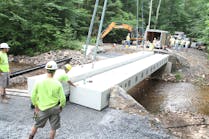Situated on the Atlantic coast, Ponte Vedra Beach, FL, is regularly battered by waves and hurricanes that wreak havoc on the coastline. Thankfully, Hayward Construction Group is just as used to building it right back up.
This past November, Hayward Construction worked on restoring Ponte Vedra Beach after years of storms washed away some of the shoreline’s structure. The firm, led by Mark Hayward, was brought in to rebuild the dunes by hauling in massive amounts of new sand.
Bringing the Sand
Getting sand to a beach isn’t as easy as taking some back with you after a seaside vacation. For beach restoration, sand is often hauled in from a mainland location or dredged up from the ocean. The Florida Department of Environmental Protection (DEP) works with the construction team to make sure the sand is well-suited for the environment it’s moved to.
“The DEP gives us the parameters to work within, and what kind of sand we can put on the beach,” says Mark. “Then we have to get a bucketful of it and give it to them for testing. Then they approve it and we can use it on the beach.”
For the Ponte Vedra project, sand was brought in from Palatka, FL, about an hour away. Once transported, the Hayward Construction team operated two Doosan crawler excavators to pile up sand and load it into three articulated dump trucks (ADTs) that made runs down the beach to drop off the load.
Though the process sounds simple, nothing that Mark or his crew did was without a plan.
“Before we hit the beach, we have a set of engineered plans and we know what we are getting ready to build,” says Mark.
Everything, from the height and appearance of the dunes, to the number of machines on the beach, was guided by the Florida Department of Environmental Protection.
There are different ways to build up a beach, but in this case, the sand was being used to fill and cover geotubes—massive sock-like bags that help build structure back into the beach and protect the inland from further erosion.
By the end, the team moved approximately 1,000 loads of sand with the help of three Doosan DA30-5 ADTs, two Doosan crawler excavators, a Bobcat skid-steer loader, and a dozer.
A Day at the Beach
Since it’s located on Florida’s Atlantic side, Ponte Vedra Beach is no stranger to this kind of reconstruction work. And, being a native of Jacksonville, neither is Mark.
Florida suffers through hurricane season every year, and with storms increasing in intensity and frequency, beaches and coastline communities rely on companies like Mark’s that know their way around the oceanic environment.
“The beach is a different animal,” says Mark. “You have to deal with the tides, the storms coming by, and Nor’easters. You have to deal with Mother Nature on the beach more than you have to deal with it if you're on the river, or on a job site clearing land. You have to pay attention to what you're doing on the beach."
Not only is there weather and tides, but wildlife as well. The beach construction season in this area is constricted to November 1 through May 1 due to sea turtle season. This restriction comes from the Florida Department of Environment Protection intending to protect the eggs that are laid on the beach each year.
"You have to line all your equipment up and get it ready to hit the beach on November 1,” says Mark.
The team was limited to working from 6–11 a.m. and 6–9 p.m., which was dictated based on the ocean tides and the county—which wanted to give beach access to the public during the middle of the day.
This leads to the other factor that plays a big part in beach work according to Mark: the public. Beaches such as Ponte Vedra Beach and Mickler’s Landing are public property, which means that the workers have to work around and with the public, visitors, and homeowners.
His team does their best to put up signs for the public, designating where they are operating and to respect the properties they are working next to.
Luckily, Mark is familiar with the area and how to best handle this work; he’s been working up and down this area of coastline for years. He started when he was around 16 and, though he switched gears for a bit, he has now been doing this type of work for the last 22 years, and 14 of those years operating Hayward Construction Group.
Though their company can do a bit of everything, they continue to focus mainly on marine construction such as this project. They often do work along beaches, rivers, or creeks—common projects being bulkheads, seawalls, docks, or retaining walls.
Due to the variety of environments they’re in and jobs they do as a general contracting company, Mark and co-owner Scot Bedingfield tend to rent a lot of equipment. They have been working with Tim Stokes at Bobcat of Jacksonville for around a decade, renting equipment such as the Doosan DX300LC-5 crawler excavator, one of Mark’s preferred machines.
Hayward Construction Group and Mark are sure to stay busy since the forces of nature are always at work, especially in the form of waves crashing into the coasts of Florida. Luckily, Mark and his company are there to help bring back the sand and keep their coastal communities afloat.
ABOUT DOOSAN INFRACORE
Doosan Infracore North America, LLC, headquartered in Suwanee, GA, markets the Doosan brand of products that includes crawler excavators, wheel excavators, mini excavators, wheel loaders, articulated dump trucks, material handlers, log loaders, and attachments.












